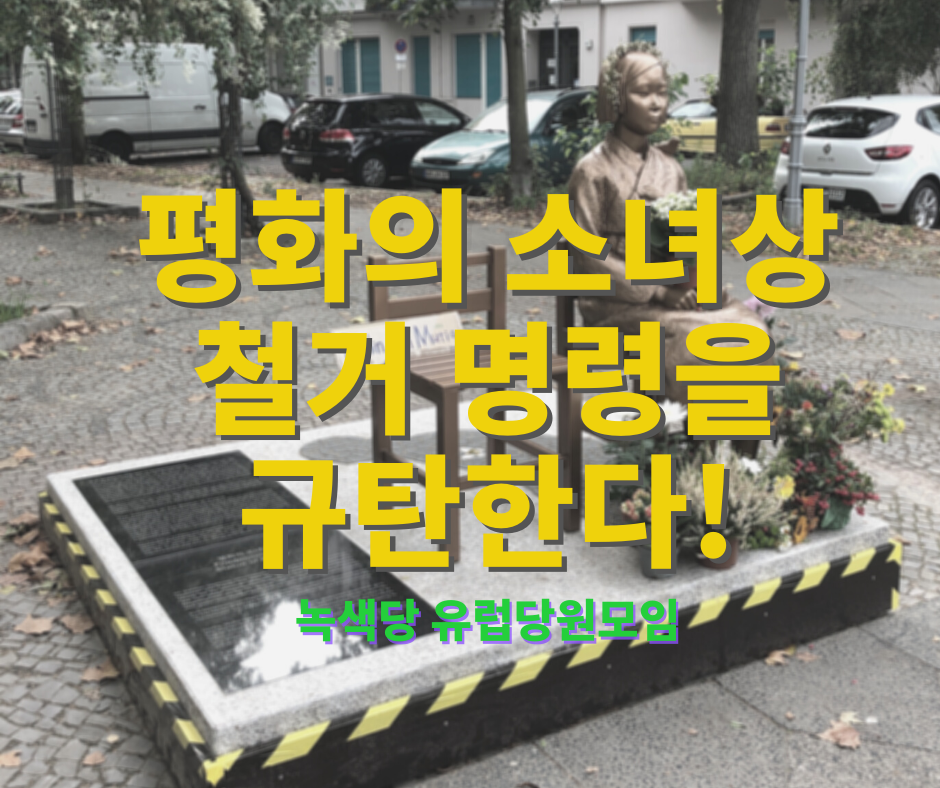2020.10.13 17:41
[English version below]

평화의 소녀상 철거 명령을 규탄한다.
오랜 기간의 노력 끝에 드디어 지난 9월 28일 (월) 베를린 미테지구 구청의 특별허가를 받아 평화의 소녀상이 설치되었다. 이로서 독일 내 최초로 공공장소에 평화의 소녀상이 설치되었다. 설치 허가를 받아낸 것은 독일 민간단체인 ‘코리아협의회(Korea Verband)’ 로 그간 독일에서 위안부 문제와 관련하여 재독일본여성모임, 재독한국여성모임, 한민족유럽연대, 국제 인권/여성단체 등이 함께 하는 연대의 중심이다. 그러나 평화의 소녀상이 설치된 지 약 일주일만에 미테지구는 10월 14일까지 평화의 소녀상을 철거해야한다는 행정명령을 코리아협의회에 전달했다. 가장 주된 이유는 평화의 소녀상 건립이 ‘현재 독일-일본 양국 관계에 갈등을 야기하고 있다'는 것이었다. 전쟁학살의 기억을 잊지않고자 부단히 노력하는 베를린에서 내려진 이같은 결정은 모순적이지 않을 수 없다.
평화의 소녀상은 제2차 세계대전 당시 식민지 한국 여성에 대한 일본제국의 반인도적 전쟁범죄를 고발하는 상징이자, 나아가 평화와 여성인권의 상징이다. 이는 일본정부에 대항하는 것이 아니라 전쟁의 만행을 기억하고 전쟁과 성폭행을 동시에 겪은 여성들에 대한 정의를 다시 세우는 것이다. 특히 지속적인 사과와 기억의 재생이라는 과거청산 원칙을 가지고 있는 독일에서 평화의 소녀상이 갖는 의미는 남다르다. 특히 베를린의 경우 홀로코스트라는 과거를 스스로 반성하고 반전, 인권, 평화에 대해 기원하는 각종 기억물 및 역사 재구성의 흔적을 도시 곳곳에서 찾아볼 수 있다. 이같이 기억문화가 구현된 전범국가의 수도에 평화의 소녀상이 건립된다는 사실 자체가 역사의 진보를 보여준다.
여성에 대한 전쟁범죄를 고발하는 평화의 소녀상 건립이 자국에 대한 명예훼손이라 주장하며 철거를 요구하는 일본 정부는 규탄받아 마땅하다. 일본 정부는 제막식을 하기 전부터 발 빠르게 외교 라인을 가동시켜 독일 연방정부를 통해 미테구청을 압박하여 1주일만에 철거 명령이 떨어지게 했다. 이는 민간을 중심으로 역사를 기억하고자 하는 자발적 기억문화 예술활동에 대한 명백한 억압이고 일본 스스로가 밝힌 바 있는 ‘책임통감과 사죄 반성의 정신'에도 역행하는 것이다.
녹색당 유럽당원모임은 평화의 소녀상 철거 명령을 규탄한다. 또한 평화의 소녀상을 민족주의적인 갈등의 도구로 전락시키려는 모든 시도를 비판한다. 평화의 소녀상은 평화와 여성인권의 상징으로서 전쟁없는 세계, 여성에 대한 전쟁범죄가 사라지는 날이 올 때까지 베를린에 남아야할 것이다.
2020년 10월 13일
녹색당 유럽당원모임
The Statue of Peace Must Stay in Berlin
After a long period of effort, the Statue of Peace was finally installed on September 28 with a special permit from the Mitte district authority in Berlin. This was the first time in Germany that the Statue of Peace was installed in a public space. The project to install the statue in Berlin was driven by the Korea Verband, a German civil organization, which has been the center of solidarity to address the "comfort women" problem in Germany together with the Japanese Women's Association in Germany, the Korean Women's Association in Germany, the Korean European Union and other international human rights/women's organizations.
About a week after the statue was installed, however, the Mitte district authority ordered the Korea Verband to remove the statue by Oct. 14. The main reason for that was that the installation of the Statue of Peace was 'causing irritation between Germany and Japan.' It is an irony that such a decision was made in Berlin, the city that is known for its commitment to remembering its dark pasts, holocaust and war crimes of the Nazi era, among others.
The Statue of Peace is not only a symbol of the Japanese Empire's anti-humanitarian war crimes against colonized Korean women during World War II but also a symbol of peace and women's rights. The installation of the statue is not to act against the Japanese government, but to remember the horrors of the war and to deliver justice to all women who have suffered wars and sexual violence within it.
It is especially meaningful to have the Statue of Peace in Germany among other countries since Germany has made great efforts to memorialize its wrongdoings and constantly apologized for them. In Berlin, in particular, memorials or historic sites that are set up to reflect on the past of the Holocaust and to pray for anti-war, human rights, and world peace can be found in many parts of the city. The very fact that the Statue of Peace is installed in the capital of Germany, where one the most notorious war crimes were committed and the culture of remembrance is realized, shows the progress of history.
The Japanese government deserves condemnation for demanding the removal of the Statue of Peace, claiming that the installation of the statue, which denounces war crimes against women, is defamation of Japan. Even before the unveiling ceremony of the statue, the Japanese government quickly operated a diplomatic line to pressure the Mitte district authority through the German federal government, prompting an order to remove the statue within a week. This is apparent oppression on a civil society-driven voluntary artistic practice of the culture of remembrance, and also it runs against "the spirit of the sense of responsibility, self-reflection and apology" that Japan itself has revealed.
We, European Chapter of the Green Party Korea, condemn the attempt to remove the Statue of Peace. We also criticize all attempts from any party to reduce the Statue of Peace to a tool of nationalistic agenda. The Statue of Peace must remain in Berlin as a symbol of peace and women's rights, until the day comes when the wars as well as violence against women in wars disappear.
13 October 2020
European Chapter of the Green Party Korea (녹색당 유럽당원모임)